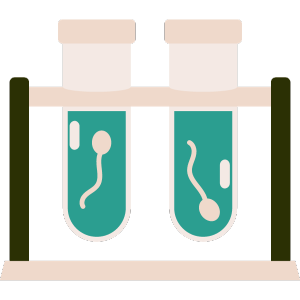In recent years, as advancements in assisted reproductive technologies continue to reshape the landscape of fertility treatments, researchers and clinicians alike have delved into the intricate details of factors influencing the success of In Vitro Fertilization (IVF). One such factor that has garnered significant attention is sperm quality. In this comprehensive blog post, we will explore the intricate relationship between sperm quality and IVF success, shedding light on the scientific nuances and the practical implications for couples undergoing fertility treatments.
Understanding IVF:
In vitro fertilization, commonly known as IVF, is a medical procedure where an egg and sperm are combined outside the body, in a laboratory dish. This fertilized egg, or embryo, is then implanted in the uterus, with the hope of establishing a successful pregnancy. IVF has proven to be a groundbreaking solution for couples facing infertility due to various reasons, such as fallopian tube issues, ovulation disorders, or unexplained fertility challenges.
The Role of Sperm in IVF:

While much attention is often focused on the female partner during fertility treatments, the male partner’s role, particularly the quality of sperm, is equally crucial. Sperm quality encompasses various factors, including sperm count, motility, morphology, and genetic integrity. These factors collectively contribute to the ability of sperm to fertilize an egg and support the subsequent development of a healthy embryo.
Sperm Quality Metrics:
Sperm Count:
Sperm count refers to the concentration of sperm in a given volume of semen. A higher sperm count enhances the probability of a successful fertilization process. Low sperm count, known as oligospermia, can be a significant hurdle in the IVF process.
Sperm Motility:
Motility is the sperm’s ability to move effectively. Progressive motility, where sperm move forward in a straight line, is particularly important for reaching and penetrating the egg. Poor motility, termed asthenospermia, can hinder the journey of sperm towards the egg.
Sperm Morphology:
Morphology means size and form of sperm. Abnormalities in sperm morphology, called teratospermia, can impact the sperm’s ability to penetrate the egg membrane and fertilize it.
Genetic Integrity:
Sperm DNA integrity is crucial for normal embryo development. DNA fragmentation, a condition where the DNA strands in sperm are damaged, can affect the success of IVF and increase the risk of miscarriage.
Scientific Insights:
Numerous studies have explored the connection between sperm quality and IVF outcomes. Research published in reputable journals has demonstrated a clear correlation between poor sperm parameters and reduced success rates in IVF cycles. A meta-analysis conducted on multiple studies revealed that couples with lower sperm quality faced a higher likelihood of IVF failure.
Moreover, research has unveiled the impact of specific sperm characteristics on embryo quality. High sperm DNA fragmentation, for example, has been associated with lower embryo implantation rates and an increased risk of early pregnancy loss.
The Influence of Lifestyle Factors:
Several lifestyle factors can significantly affect sperm quality and, consequently, IVF success. Habits such as smoking, excessive alcohol consumption, and exposure to environmental toxins have been linked to decreased sperm quality. A balanced diet, regular exercise, and stress management are recognized as positive contributors to optimal sperm health.
Veramed Fertility and IVF, situated in Shalimar Bagh, New Delhi, stands out as a premier provider of top-notch IUI and IVF treatment services in Delhi. If you’re navigating fertility challenges, book an appointment now with the best infertility specialist, Dr. Deepika Jagga.
Technological Advancements in Assessing Sperm Quality:

Advancements in reproductive medicine have introduced sophisticated techniques for assessing sperm quality with greater precision. Computer-assisted sperm analysis (CASA) provides detailed information on sperm motility and morphology, aiding clinicians in selecting the healthiest sperm for IVF procedures. Additionally, tests like sperm DNA fragmentation analysis offer insights into genetic integrity, helping tailor fertility treatments to individual needs.
Practical Implications for Couples:
Understanding the impact of sperm quality on IVF success carries significant implications for couples undergoing fertility treatments. It emphasizes the importance of a comprehensive fertility assessment for both partners, ensuring that potential challenges related to sperm quality are identified and addressed early in the treatment process.
Couples facing issues with sperm quality may benefit from additional interventions, such as sperm washing or intracytoplasmic sperm injection (ICSI), where a single sperm is directly injected into an egg. These techniques can overcome certain barriers associated with poor sperm quality, increasing the chances of successful fertilization.
Conclusion:
In conclusion, the relationship between sperm quality and IVF success is a multifaceted aspect of assisted reproductive technologies that warrants careful consideration. As the field continues to evolve, ongoing research and technological innovations hold promise for further improving outcomes for couples struggling with infertility. Acknowledging the role of sperm quality in the IVF journey underscores the need for a holistic approach to fertility treatments, addressing both male and female factors to optimize the chances of achieving a healthy and successful pregnancy.

